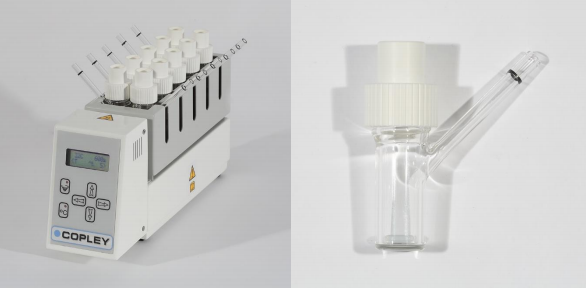19 April 2018; Nottingham, UK: Copley Scientific, a leading manufacturer of laboratory testing equipment, has introduced a new Vertical Diffusion Cell (VDC) for efficient in vitro skin permeation studies. The VDC will find application in R&D in chemical, pharmaceutical, cosmetics and other industries. As with Copley’s existing VDCs, the new cell is designed for use with the HDT 1000 Vertical Diffusion Cell Test System; a compact heater stirrer unit for precisely controlled benchtop testing, and the Copley Vacuum De-aeration apparatus.
Drug delivery to, or through, the skin is an important approach for various drug types. Topical creams, ointments and gels (semisolid products) are intended to remain on the skin surface where they release an active substance to achieve a localized effect, the relief of a dermatological condition, for example. In contrast, transdermal formulations such as nicotine patches must deliver their active substance through the skin and into the bloodstream for systemic effect. In each case, specific testing is required during product development and quality control of finished products – either to show topical release or to demonstrate permeation and absorption.
To meet these requirements, Copley Scientific has now added the skin-specific cell to its range of VDCs. The new cell has a surface diameter of 15 mm, surface area of ~ 1.77 cm2 and volume of 12 mL. The cell comes with a screw cap designed for “open” or “closed” use, accommodating the complete range of skin and membranes used for semisolid and permeability testing: ‘epidermal’ (approximately 0.1 mm thick), ‘split-thickness’ (approximately 0.2 – 0.5 mm thick) and ‘full-thickness’ (0.5 – 1 mm thick). Copley also offers two other cells – Types ‘B’ and ‘C’, both available in “open” and “closed” top format, targeting semisolids testing in accordance with United States Pharmacopeia (USP) chapter <1724> where thin, artificial membranes are used.
Each cell comprises three main parts: a top sample holder to contain the sample of product to be tested, and a bottom reservoir with the receptor medium. These are separated by a support ring that firmly holds the membrane or skin in place. This construction allows diffusion to take place and ensures that the membrane remains in contact with the receptor medium throughout the testing procedure.
In order to accommodate ‘full-thickness’ membranes or skin, and in contrast to the Type ‘B’ and ‘C’ cells, which use a 3-pronged spring clip, a new screw-type cell closure mechanism has been developed for the skin-specific cell that ensures proper contact between the sample and the receptor medium. All components of the cell are made from FDA-approved inert materials and a side sampling arm facilitates easy filling, sample withdrawal and media replacement.
Anna Sipitanou, Business Development Manager at Copley Scientific, commented “The addition of this innovative cell to our range opens up new possibilities for our customers. Some may standardise on the skin specific cell as it can accommodate all thicknesses of membrane in one unit; others will now be able to consider new procedures that need much thicker membranes. At Copley, we pride ourselves on developing novel solutions to common industry challenges and I am pleased that now, whether they are performing in vitro release testing of topical creams, ointments and gels; assessing the performance of a transdermal products; or investigating the effects of chemicals on the skin; we have a robust testing solution that will meet all requirements.”
To find out more about the new skin specific Vertical Diffusion Cell, contact: sales@copleyscientific.co.uk
To see Copley’s full programme of equipment for inhaled drug, pharmaceutical and detergent testing, download brochures from: http://www.copleyscientific.com/downloads/brochures
CAPTION: The HDT 1000 Vertical Diffusion Cell Test System (left) pictured with the new skin specific VDCs (right).
About Copley Scientific
Copley Scientific is widely recognised as the world’s leading manufacturer and supplier of inhaler test equipment and is a major provider of testing systems for other pharmaceutical dosage forms. The company also supplies equipment for detergent testing.
Copley Scientific’s pharmaceutical product range includes test equipment for all types of orally inhaled and nasal drug products – metered-dose inhalers, dry powder inhalers, nebulizers and nasal sprays – with a particular focus on solutions for delivered dose uniformity and aerodynamic particle size distribution measurement. It also includes testers for tablets (dissolution, disintegration, friability and hardness) capsules, powders, suppositories, semisolids and transdermals.
Used from R&D through to QC, this extensive range of equipment is supported by a full validation and aftersales service. Copley Scientific has offices in the UK and Switzerland and works in partnership with aerosol particle science experts MSP Corporation in North America; specialist distributors extend localised support across the world. This network provides expert help and training to every customer, directly enhancing the application of all Copley Scientific products.

